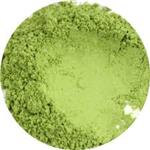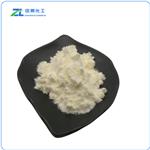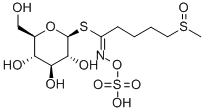Glucoraphanin – An Antioxidant for Health
Glucoraphanin is a glucosinolate found in broccoli, cauliflower, and mustard. Glucoraphanin is converted to sulforaphane by the enzyme myrosinase. In plants, sulforaphane deters insect predators and acts as a selective antibiotic. In humans, sulforaphane has been studied for its potential affects in neurodegenerative and cardiovascular diseases. Due to the potential health benefits, a variety of broccoli has been bred to contain two to three times more glucoraphanin than standard broccoli [1].

Potassium salt of glucoraphanin
In the early 1990’s, scientists at Johns Hopkins University (JHU) identified a compound derived from broccoli called glucoraphanin [2]. Glucoraphanin acts as part of the plant’s defense system. In fact, once converted to its bioactive form, sulforaphane, it is responsible for the characteristic sulfur smell/taste of broccoli. Glucoraphanin belongs to a category of compounds called glucosinolates, which are naturally found in cruciferous vegetables –with broccoli being the king of glucoraphanin. It is converted into sulforaphane by an enzyme found in broccoli called myrosinase or, if this enzyme is deactivated through the cooking process, the body's gut microflora will perform the conversion. In the broccoli plant, myrosinase and glucoraphanin are kept in different cellular compartments. When the plant is chewed or cut, the myrosinase and glucoraphanin interact, resulting in the conversion of glucoraphanin into sulforaphane. Because sulforaphane is bitter, it discourages animals from eating the plant! In the course of their experiments, the JHU scientists discovered that sulforaphane was one of the most potent naturally occurring activators of our phase II detoxification system. This led to a flurry of publications demonstrating the effect that sulforaphane, glucoraphanin and broccoli extracts have on the activation and expression of specific phase II enzymes.
Glucoraphanin is a powerful and long-lasting antioxidant, found primarily in broccoli. However, the amount varies tremendously from one broccoli plant to another with no way for consumers to tell how much glucoraphanin is in the broccoli they buy. It has also been shown that this phytonutrient is present in much higher concentrations in the broccoli seeds and 3-day old broccoli sprouts. Brassica created TrueBroc® glucoraphanin from broccoli seeds in order to provide consumers with a concentrated source of glucoraphanin that contains consistent and meaningful levels. Glucoraphanin belongs to a category of compounds called glucosinolates which are naturally found in cruciferous vegetables. Glucosinolates are enzymatically converted into isothiocyanates, which are active in the body. This enzymatic conversion is performed by myrosinase, which is also found naturally in cruciferous vegetables [3].
Bioavailability studies indicate that glucoraphanin can be absorbed intact, but when eaten within broccoli it is primarily converted to sulforaphane during chewing, which is then absorbed in the upper intestine. Intact glucoraphanin can also be converted to sulforaphane by gut microflora (Holst & Williamson, 2004). A study of rats indicated that glucoraphanin purified from broccoli seed is recovered in the urine, with no glucoraphanin or metabolites found in feces. Urinary products of glucoraphanin were studied, with both oral and intraperitoneal delivery, with 20% and 45% of the dose recovered in urine, respectively. The study indicated that if glucoraphanin is absorbed intact, it undergoes enterohepatic circulation and is hydrolyzed in the gut (Bheemreddy & Jeffery, 2007). This absorption of glucoraphanin, rather than the biologically active derivative sulforaphane, is important, since cooking can destroy myrosinase, thereby preventing pre-absorption metabolism of glucoraphanin[4].
Once glucoraphanin is converted to sulforaphane, it becomes a potent antioxidant in the body and helps to boost the body’s natural detoxification pathways. By eliminating harmful toxins and pollutants – alcohol, cigarette smoke, ultraviolet light, high fructose corn syrup and other toxins that creep into our daily lives – we can experience:
- Increased energy levels
- Healthier skin and hair
- Decreased signs of premature aging
- Healthier immune system
Myrosinase-like activity also occurs in our intestinal microflora so if glucoraphanin is consumed by itself, our gut microflora will convert a portion of it to sulforaphane. As in many types of metabolism modulated by the microbiome, this conversion rate varies from individual to individual.
References
[1] https://en.wikipedia.org/wiki/Glucoraphanin
[2] Fahey & Talalay; Food Chem Toxicol. 1999 Sep-Oct;37(9-10):973-9
[3] https://truebroc.com/what-is-glucoraphanin/
[4] Simone J. Rochfort, Rod Jones, in Nuts and Seeds in Health and Disease Prevention, 2011, 253-261. Chapter 30 - Glucosinolate Phytochemicals from Broccoli (Brassica oleracea L. var. botrytis L.) Seeds and Their Potential Health Effects
You may like
See also
Lastest Price from GLUCORAPHANIN manufacturers

US $1200.00-1100.00/ton2025-10-29
- CAS:
- 21414-41-5
- Min. Order:
- 1ton
- Purity:
- 99%
- Supply Ability:
- 1000T/M

US $150.00/kg2025-04-21
- CAS:
- 21414-41-5
- Min. Order:
- 1kg
- Purity:
- 99%
- Supply Ability:
- 500kg


